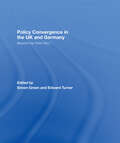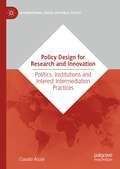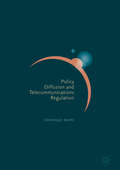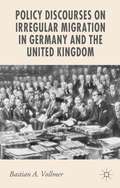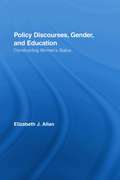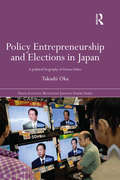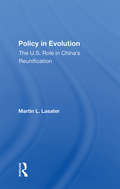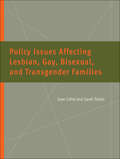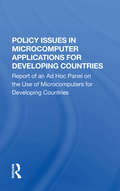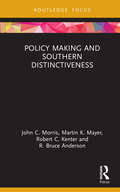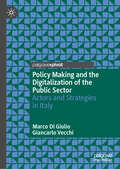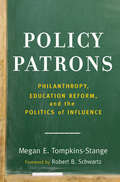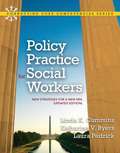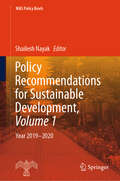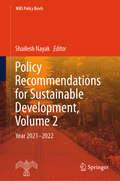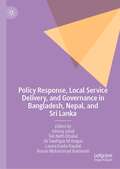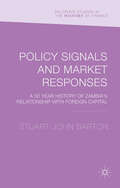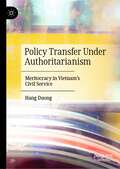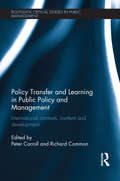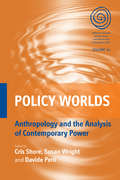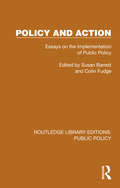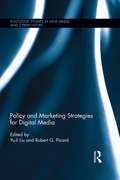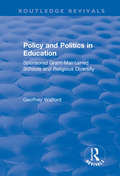- Table View
- List View
Policy Convergence in the UK and Germany: Beyond the Third Way?
by Simon Green and Edward TurnerPolicy convergence and policy learning have emerged as central themes in the study of public policy in recent years. This book complements the rich literature on theoretical aspects as well as individual case studies by undertaking a systematic comparison of policy convergence between two specific countries, the UK and Germany. Both are member-stat
Policy Design for Research and Innovation: Politics, Institutions and Interest Intermediation Practices (International Series on Public Policy)
by Claudia AcciaiThis book investigates the determinants of policy design choices in an area of public policy embracing multiple sectors of public responsibilities: Research and Innovation (R&I). Drawing on case studies from France and Italy, it assesses how governments design research and innovation policy strategies. It also examines how policymakers and stakeholders translate their interests into different design strategies, and the impact of varying political orientations and institutional setups on shaping choices for alternative policy instruments. Lastly, the book considers how the interactions between policy makers and policy takers influence policy design choices. It will appeal to scholars and students of comparative public policy, public administration, emerging technologies, and governance.
Policy Diffusion Dynamics in America
by Graeme BousheyPolicy Diffusion Dynamics in America integrates research from agenda setting and epidemiology to model factors that shape the speed and scope of public policy diffusion. Drawing on a data set of more than 130 policy innovations, the research demonstrates that the "laboratories of democracy" metaphor for incremental policy evaluation and emulation is insufficient to capture the dynamic process of policy diffusion in America. A significant subset of innovations trigger outbreaks - the extremely rapid adoption of innovation across states. The book demonstrates how variation in the characteristics of policies, the political and institutional traits of states, and differences among interest group carriers interact to produce distinct patterns of policy diffusion.
Policy Diffusion and Telecommunications Regulation
by Véronique WavreThis study investigates regulatory reforms in the telecommunications sector of Middle Eastern and North African (MENA) countries. It explores telecommunications innovations in three developing economies (Morocco, Jordan and Egypt), with a focus on regional and European trends in telecommunications policies. Common knowledge suggests that the European Union and its member states are the main influential regulatory power in the MENA region. However, the empirical analysis of selected telecommunications regulations: universal service obligation (USO) and spectrum management, reveals that reforms are not always determined by European countries but may also originate from other developing countries, such as Peru and Chile. This finding attests to the rise of regulatory influence from the Global South, which challenges traditional transfers of regulations originating from more industrially advanced countries.
Policy Discourses On Irregular Migration In Germany And The United Kingdom
by Bastian A. VollmerMigration expert Bastian Vollmer explores the contentious issue of irregular migration in the highly-charged contexts of Germany and the UK. Through policy and discourse analysis the author explains why, despite the differing contexts and migration histories, German and British policy responses to the issue are now on a convergent path.
Policy Discourses, Gender, and Education: Constructing Women's Status (Routledge Research in Education)
by Elizabeth J. AllanDespite over thirty years of activism and legislation to eliminate discrimination, parity has yet to be achieved for women in academe. This book describes policy discourse analysis as a framework for considering how those involved in policy-making efforts may make use of discourses that inadvertently undermine the intended effect of the policies they set forth. Allan illustrates the methods of policy discourse analysis by describing their use in a study of twenty-one women's commission reports. In so doing, she highlights the important work of university women's commissions while uncovering policy silences and making visible the powerful discourses framing gender equity policy initiatives in higher education. Her findings reveals how dominant discourses of femininity, access, professionalism, race, and sexuality contribute to constructing women's status in complex and at times, contradictory ways. This important volume will interest researchers across a number of disciplines including policy studies, educational leadership, higher education and cultural studies of education.
Policy Entrepreneurship and Elections in Japan: A Political Biogaphy of Ozawa Ichirō (Nissan Institute/Routledge Japanese Studies)
by Takashi OkaOzawa Ichirō is one of the most important figures in Japanese politics, having held the positions of Chief Secretary of the Liberal Democrat Party and, after defection from the LDP, President of the Democratic Party of Japan. Ozawa has distinctive ideas that set him apart from the average Japanese politician, he believes in the concept of the independence of the individual, as opposed to the importance of the group, and as a policy entrepreneur he has had a huge impact on political change not only advocating but precipitating institutional change in a key political area – the election system. Using extensive interview data from key players in the political arena, this book examines Ozawa's struggle to normalize alternation in office between two competingpolitical parties – particularly significant given the results of the 2009 election which handed over power to the Democratic Party of Japan – and how he has used his entrepreneurial talents to precipitate and carry out institutional change. Not only a political biography, but also an in-depth analysis of the Japanese political and electoral systems, this book will be of huge interest to anyone interested in Japanese politics and electoral systems.
Policy In Evolution: The U.s. Role In China's Reunification
by Martin L LasaterThe reunification of Taiwan with China is one of the most important policy issues of our time. The issue has broad strategic, political, economic, and moral ramifications for the U.S., as well as for Chinese on both sides of the Taiwan Strait. The People's Republic of China (PRC) has assigned top political priority to reunification and has made the
Policy Issues Affecting Lesbian, Gay, Bisexual, and Transgender Families
by Sean Cahill Sarah TobiasCahill is with the National Gay and Lesbian Task Force Policy Institute; Tobias is a lesbian, gay, bisexual, and transgender (LGBT) activist currently with Demos, a New York City-based think tank. They offer an up-to-date analysis of the major policies affecting lesbian, gay, bisexual, and transgender (LGBT) people, their same-sex partners, and their children. Coverage includes an overview of what is known about LGBT families and the policy issues affecting them, ranging from discrimination to domestic partnership, from health insurance access to family and medical leave; recent political and intellectual history framing the struggle over LGBT family policy; and an assessment of the extent to which the pursuit of same-sex marriage is currently reflective of the priorities of the LGBT community. For researchers, policymakers, and individuals interested in better understanding same-sex couple families in the U. S. Annotation ©2007 Book News, Inc. , Portland, OR (booknews. com)
Policy Issues In Microcomputer Applications For Developing Countries
by Report of an Ad Hoc Panel on the Use of Microcomputers for Developing CountriesThe growth of microcomputer applications in industrialized countries is predicated on an existing base that includes the ready availability of affordable hardware and software, trained personnel, capable maintenance, efficient communication systems, and a benign environment; applications are selected and facilitated by a wide range of underlying ex
Policy Making and Southern Distinctiveness (Routledge Research in Public Administration and Public Policy)
by John C. Morris Martin K. Mayer Robert C. Kenter R. Bruce AndersonPolicy Making and Southern Distinctiveness examines the uniqueness of southern politics and their policy choices. While decades of scholarship on the politics of the American South have focused on partisanship and electoral outcomes as the primary elements of interest in southern politics, few works have focused on the more practical outcomes of these political processes, specifically, comparing state policy choices of southern states to non-southern states. This book examines six different policy arenas: voting access, gun control, health care, reproductive rights, water, and COVID-19 pandemic response, comparing policy choices in states in the South with states in the non-South. The authors find that the South is distinct in several, but not all, of the policy arenas examined. They conclude that the South as a region is unique because of the exceptional degree of one-party control evident in the South, coupled with a long-standing preoccupation with partisanship and race-based politics. Policy Making and Southern Distinctiveness provides valuable insights into how and why states behave in the manner they do and where southern states may diverge from the rest of the country. It will be of interest to scholars of southern politics, state comparative policy, public policy, American politics, and federalism/intergovernmental relations.
Policy Making and Southern Distinctiveness (Routledge Research in Public Administration and Public Policy)
by John C. Morris Martin K. Mayer Robert C. Kenter R. Bruce AndersonPolicy Making and Southern Distinctiveness examines the uniqueness of southern politics and their policy choices.While decades of scholarship on the politics of the American South have focused on partisanship and electoral outcomes as the primary elements of interest in southern politics, few works have focused on the more practical outcomes of these political processes, specifically, comparing state policy choices of southern states to non-southern states. This book examines six different policy arenas: voting access, gun control, health care, reproductive rights, water, and COVID-19 pandemic response, comparing policy choices in states in the South with states in the non-South. The authors find that the South is distinct in several, but not all, of the policy arenas examined. They conclude that the South as a region is unique because of the exceptional degree of one-party control evident in the South, coupled with a long-standing preoccupation with partisanship and race-based politics.Policy Making and Southern Distinctiveness provides valuable insights into how and why states behave in the manner they do and where southern states may diverge from the rest of the country. It will be of interest to scholars of southern politics, state comparative policy, public policy, American politics, and federalism/intergovernmental relations.
Policy Making and the Digitalization of the Public Sector: Actors and Strategies in Italy
by Marco Di Giulio Giancarlo VecchiThis book examines the evolving phenomenon of digital transformation in the public sector. First, it provides a theoretical understanding of public sector digitalization, considers policy dilemmas that may hinder it, and assesses strategies for successful digital transformation. It then provides an empirical analysis of public sector digitalization, considered in the context of the EU digital strategy. Drawing on national, regional and local case studies, the book then assesses digital transformation in Italy, in order to examine policy strategies in real contexts. It demonstrates that digitalization is not simply a process of replacing humans with machines, but a complex and controversial process involving policy design and implementation. The policy framework also provides a basis for evaluating the successes and failures of digital government projects, which will be applicable in many other countries. The book will appeal to all those interested in public policy, public administration and public management, as well as digitalization and technology studies.
Policy Patrons: Philanthropy, Education Reform, and the Politics of Influence (Educational Innovations Series)
by Megan E. Tompkins-StangePolicy Patrons offers a rare behind-the-scenes view of decision making inside four influential education philanthropies: the Ford Foundation, the W. K. Kellogg Foundation, the Bill & Melinda Gates Foundation, and the Eli and Edythe Broad Foundation. The outcome is an intriguing, thought-provoking look at the impact of current philanthropic efforts on education. Over a period of several years, Megan E. Tompkins-Stange gained the trust of key players and outside observers of these four organizations. Through a series of confidential interviews, she began to explore the values, ideas, and beliefs that inform these foundations&’ strategies and practices. The picture that emerges reveals important differences in the strategies and values of the more established foundations vis-à-vis the newer, more activist foundations—differences that have a significant impact on education policy and practice, and have important implications for democratic decision making. In recent years, the philanthropic sector has played an increasing role in championing and financing education reform. Policy Patrons makes an original and invaluable contribution to contemporary discussions about the appropriate role of foundations in public policy and the future direction of education reform.
Policy Practice For Social Workers: New Strategies For A New Era (Connecting Core Competencies Series)
by Laura Pedrick Linda Cummins Katharine ByersIntroduction to Policy Practice shows future social work practitioners how to actively influence policy-making through lobbying, coalition building and running campaigns. It helps them to master social problem analysis and policy analysis and uses theoretical and empirical knowledge for the application of policy practice techniques. Each chapter reflects and integrates the core competencies in the 2008 Educational Policy and Accreditation Standards (EPAS) set by the Council on Social Work Education (CSWE). End-of-chapter assessment reinforces this integration, and MySocialWorkLab.com activities support the mastery of CSWE's core competencies.
Policy Recommendations for Sustainable Development, Volume 1: Year 2019_2020 (NIAS Policy Briefs)
by Shailesh NayakThe book contains policy-related publications based on research conducted by the National Institute of Advanced Studies. These publications address and support sustainable development goals, such as energy and the environment, education, inequality, human development, and peace research, among others. This volume fosters comprehensive research focused on these global targets and endeavors to address some of society's greatest grand challenges. The book will be extremely beneficial for researchers, academicians, practitioners, and policymakers working in the areas of the 17 Sustainable Development Goals (SDGs).
Policy Recommendations for Sustainable Development, Volume 2: Year 2021-2022 (NIAS Policy Briefs)
by Shailesh NayakThe book contains policy-related publications based on research conducted by the National Institute of Advanced Studies. These publications address and support sustainable development goals, such as energy and the environment, education, inequality, human development, and peace research, among others. This volume fosters comprehensive research focused on these global targets and endeavors to address some of society's greatest grand challenges. The book will be extremely beneficial for researchers, academicians, practitioners, and policymakers working in the areas of the 17 Sustainable Development Goals (SDGs).
Policy Response, Local Service Delivery, and Governance in Bangladesh, Nepal, and Sri Lanka
by Ishtiaq Jamil Tek Nath Dhakal Sk Tawfique M Haque Laxmi Kanta Paudel Hasan Muhammad BaniaminThis book analyzes contemporary issues in governance, policy management, and policy performance both at the central and local levels in Bangladesh, Nepal, and Sri Lanka. The focus is on some central social issues such as empowerment, the inclusion of minorities, institutional trust, policy implementation, and local service delivery. Although these three countries have recently opted for democratic governance, the journey to establish and consolidate democracy as well as enhance governance capacity have been painful and filled with challenges. The chapters in this volume are country specific studies based on empirical data both quantitative and qualitative collected for several years and presented in readable prose. This does not, however, rule out the general applicability of the findings to other contexts within and beyond the borders of these countries. Despite huge differences in South Asia, the policy and governance issues and challenges that are explored, highlighted, and analyzed also have commonalities with other South Asian countries.
Policy Signals and Market Responses: A 50 Year History of Zambia's Relationship with Foreign Capital (Palgrave Studies in the History of Finance)
by Stuart John BartonThe study presents archival evidence to show how President Kaunda raised political and economic exclusivity in Zambia in the early years of Zambia's independence, and how this retarded capital investment. Despite formal reforms and a new government, this institutional mechanism still dominates and constrains Zambia's political economy today.
Policy Transfer Under Authoritarianism: Meritocracy in Vietnam's Civil Service
by Hang DuongThis book provides a comprehensive analysis of policy transfer in authoritarian regimes. Focusing on Vietnam, it explores how and why authoritarian governments learn from other countries, and the significance of policy transfer outcomes. By examining merit-based policy transfer in Vietnam's civil service and comparing it with policy transfer in China, the book uncovers key aspects of policy transfer in one-party authoritarian systems. In doing so, it addresses an important gap in the literature on policy transfer, that has predominantly focused on Western democracies. The book highlights the role of the ruling party in overseeing policy transfer and the resulting consolidation of authoritarian power structures. It also provides theoretical recommendations for future research and addresses the practical implications of policy transfer and meritocratic reform in authoritarian contexts. It will appeal to all those interested in public policy, authoritarianism, and Asia-Pacific studies.
Policy Transfer and Learning in Public Policy and Management: International Contexts, Content and Development (Routledge Critical Studies in Public Management)
by Peter Carroll Richard CommonA typical image of the making and administration of policy suggests that it takes place on an incremental basis, involving public servants, their ministers and, to a more limited extent, a variety of interest groups. Yet, much policy making is based on similar policy developed in other jurisdictions and in the major international organizations such as the WTO and the OECD. In other words, significant aspects of nationally developed policies are copied from elsewhere in what is described as a process of policy transfer and learning. Hence, studies of policy transfer have pointed to a distinct limitation in most existing theoretical and empirical explanations as to how policy is made and implemented through their neglect of the role of policy transfer and learning. Moreover, policy transfer is not only a concern of academics, but a growing concern for governments. The latter are concerned to improve the performance of their policy and several have placed a greater, more systematic focus on policy transfer as a means to increasing performance. This book presents a variety of cases from differing national and international contexts that enable a valuable, comparative analysis that is absent from most literature currently available and that suggest a number of exciting research directions with implications for policy making, transference and implementation in the future.
Policy Worlds: Anthropology and the Analysis of Contemporary Power (EASA Series #14)
by Susan Wright Davide Pero Cris ShoreThere are few areas of society today that remain outside the ambit of policy processes, and likewise policy making has progressively reached into the structure and fabric of everyday life. An instrument of modern government, policy and its processes provide an analytical window into systems of governance themselves, opening up ways to study power and the construction of regimes of truth. This volume argues that policies are not simply coercive, constraining or confined to static texts; rather, they are productive, continually contested and able to create new social and semantic spaces and new sets of relations. Anthropologists do not stand outside or above systems of governance but are themselves subject to the rhetoric and rationalities of policy. The analyses of policy worlds presented by the contributors to this volume open up new possibilities for understanding systems of knowledge and power and the positioning of academics within them.
Policy and Action: Essays on the Implementation of Public Policy (Routledge Library Editions: Public Policy)
by Colin Fudge Susan BarrettIt is widely appreciated that policies, however carefully formulated, too often fall down at the implementation stage. This collection, originally published in 1981 and which includes a number of case studies illustrating the roles and workings of the agencies involved, focuses on implementation in public policy. Part 1 reviews the literature on implementation and provides a theoretical context for examining the ten case studies in Part 2, which cover such policy areas as public expenditure, employment, housing, social services, health, planning and land. The editors also examine the main issues raised by the case studies and suggest a way of reconstructing an understanding of the implementation of public policy.
Policy and Marketing Strategies for Digital Media (Routledge Studies in New Media and Cyberculture)
by Robert G. Picard Yu-Li LiuWith digital media becoming ever more prevalent, it is essential to study policy and marketing strategies tailored to this new development. In this volume, contributors examine government policy for a range of media, including digital television, IPTV, mobile TV, and OTT TV. They also address marketing strategies that can harness the unique nature of digital media’s innovation, production design, and accessibility. They draw on case studies in Asia, North America, and Europe to offer best practices for both policy and marketing strategies.
Policy and Politics in Education: Sponsored Grant-maintained Schools and Religious Diversity (Routledge Revivals)
by Geoffrey WalfordThis title was first published in 2000: This is an examination of the sponsored grant-maintained schools initiative. These schools were an attempt to increase the diversity of schools within the state-maintained sector so families would have a greater choice when selecting the most desirable school for their children. Thus allowing schools to be run by religious and ethnic minority groups. The book considers and analyzes the political nature of the policy formulation and implementation. It examines the way the 1993 Education Act came to be formulated and follows its path within the changing social, economic and political context of the years 1993 to 1998. The text examines the background to the applications for funding from religious minority and other groups and discusses the implications of such a changes in funding policy in the context of the 1998 School Standard and Framework Act.
